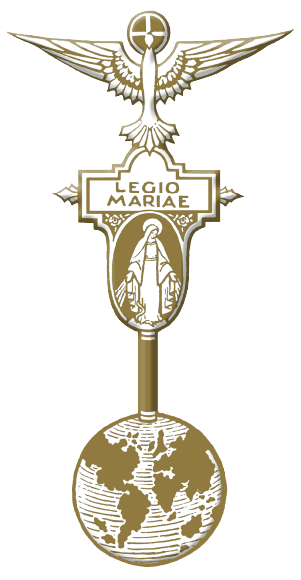January 2020 Allocutio
The Legion of Mary and Christian Unity
By Fr. Bede McGregor O.P.
Spiritual Director of the Concilium
Yesterday we started the Octave of Prayer for Church Unity that is observed throughout most of the Christian world Catholic and non-Catholic. It started in 1908 by the Franciscan Friars of the Atonement and took its inspiration from the prayer of Jesus recorded in the Gospel of John chapter 17, especially the words “May they all be one, Father, may they be one in us, as you are in me and I am in you… May there be one flock and one Shepherd.” We know from Sacred Scripture that Our Lord often withdrew from everyone to pray alone but sometimes he prayed aloud in the presence of his disciples thereby sharing his intimacy with the Father with them. Can there be anything more precious than to listen to the heart of Jesus at prayer? Of course,
Our Lord not only prayed about Christian Unity he also ceaselessly preached about it. “Love one another as I have loved you”....Forgive one another as the Father forgives each one of you, Love even our enemies. This is absolutely basic Christian discipleship. Yet despite all that Jesus said and did concerning Christian Unity there has been a long history of disunity sometimes locally or with small groups but also tragically on a large scale e.g. the great Schism in 1054 and the Reformation in 1517.
The Octave of Prayer is one of the responses to the scandal of Christian Disunity. It includes a prayer of thanksgiving because there has been great progress in reconciliation – not just tolerance of each other nor even genuine respect but authentic love for each other. An ecumenism of the heart is taking place. We cannot be united to each other on the basis of any compromise of doctrines of faith and this may seem to raise insuperable obstacles to progress but the words of John Wesley may be helpful: “Though we cannot think alike, may we not love alike? May we not be of one heart, although we are not of one opinion? Without any doubt we may.”
Ecumenical prayer must also include a prayer of repentance for the part we may have played in the disunity either by deed or omission. Our indifference to Christian Unity can be insidiously harmful.
It should include incessant prayer for progress in Unity and complete reunification. As St. John Paul II wrote in his great encyclical “Ut Unum Sint” “there are no special times, situations, or places of prayer for unity. Christ’s prayer to the Father is offered as a model for everyone, always and everywhere.”
Concern for Christian Unity is central to the heart of Jesus and therefore it must also be central to the heart and mission of the Church and flowing from these truths it must be central to the vocation of the Legion of Mary too. Thank God, historically the Legion has always engaged in the apostolate for Christian Unity. Frank Duff our founder showed a remarkable commitment to work for Christian Unity. In 1939 he was instrumental in the founding of “A League for the Reunion of Christendom.” In 1941 he was pivotal in the founding of the Mercier Society for the better mutual understanding between Protestants and Catholics. He said he could scarcely bear thinking of his Protestant friends being deprived of the real presence of Our Lord in the Eucharist in their beliefs and practice. Saint John Henry Newman once defined a gentleman as someone who could disagree without being disagreeable. It surely fits Frank Duff perfectly and should be applied to every good legionary. Certainly, Frank Duff was influenced by bishops like Cardinal Mercier and priests like Fr. Paul Watson, the founder of the Octave of Prayer for Christian Unity and especially by an outstanding series of Popes who strenuously promoted Christian Unity but it is remarkable that a lay person at that time gave such example and leadership in the whole ecumenical movement. He certainly wanted the Legion to continue this great apostolate.
If the Legion is to have a significant part to play in ecumenism it must treasure unity within itself. This principle is at least implicit throughout the Handbook. Perhaps the most important chapter in the Handbook is the last one, namely: “The Greatest of these is Love”. Let me give one quotation: “Within its own ranks there should be an unaffected simplicity and sincere mutual charity among the members, all distinctions being non-existent. If love is due to those whom the legionary serves, it is no less due to one’s fellow members. The spirit of distinction is evidence of the absence of the first qualification for membership, which is the spirit of love. The whole idea and spirit of the Legion is one of intense charity and sympathy, which before radiating its warmth outside must first of all burn brightly and strongly on the domestic hearth of the Legion itself. “By this will everyone know you are my disciples, if you have love for one another”. (Jn 13:35)
Charity practised in its rank will soon be practised at large. Divisions removed by membership are on the way to being removed from people outside.”
Next year we will be celebrating the centenary of our existence and I suggest it would be a good time for an examination of conscience of our Legion history.
On the whole we have been wonderfully blessed by the gift of God and Mary of a splendid unity of spirit and action but wherever and whenever our unity has been threatened or challenged we pray for healing and work towards it so that we can rejoice more fully in the celebrations of thanksgiving and fraternity.
Lastly, St. Pope Paul VI gave Mary two titles: Mother of the Church and Mother of Unity. Let us entrust our commitment to internal unity and Christian Unity in the Universal Church to Mary under these two titles. Amen.

